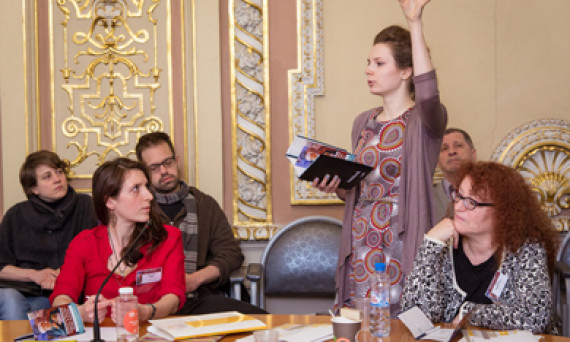On April 16th and 17th, EUSP hosted an international conference organized by the Gender Studies Program with support from the EUSP’s Committee on Academic Planning.
The motto “the personal is political” is widely known in the social sciences. But by including the personal in the political sphere we often forget that politics permeate social relations and life at a micro level: in caring for vulnerable social groups, in professional activities, and in bodily practices. This two-day conference was devoted to the convergence of the political and personal in the broadest sense.
The first session focused on reproductive health. Michele Rivkin-Fish (University of North Carolina, Chapel Hill) presented on the practices of activist struggles in Russia and the United States related to accessing abortions. An important distinction in the activities of Russian feminists is that they appear in public with a much softer stance that is capable of resonating with the population. Anna Temkina (EUSP) examined the process of commercializing obstetric services in St. Petersburg. Anastasiia Novkunskaia continued on the topic of neoliberal transformations in Russian medicine, presenting the results of a study on institutionalized care for pregnant and parturient women in small cities.
The next group of presentations was devoted to the social aspects of new reproductive technologies as well as the difficulty pregnant women living with HIV have in accessing health care. Tatiana Shchurko (Institute of Political Studies “The Political Sphere”) spoke about “biopolitical games” in Belarus that are manifested in the construction of norms of “correct” and “incorrect” fertilization.
Christina Weis (De Montfort University) presented the results of a study on practices of organizing surrogate motherhood. She showed that uncertainty in the rules of interaction, mutual distrust and differences in expectations often lead to conflicts between surrogate mothers and prospective parents, as well difficulty fulfilling the emotional needs of both sides.
The final presentation of the first session was given by Irina Evdokimova, Yuliia Godunova and Rebecca Perkins, associates of the non-profit “EVA” partnership. They noted that contemporary society has seen significant progress in improving the quality of life for people living with HIV. Having a sex life has become much safer for them and their partners, and the possibility of giving birth to healthy children has become a reality. In spite of this, medical personnel in the field of reproductive health still maintain prejudices that lead to discrimination and the violation of the rights of women living with HIV.
The next session continued on the topic of medical assistance to mothers. In a presentation on alternative means of obstetrics within the Russian context, Ekaterina Borozdina (EUSP) focused on the issue of intersectionality and of the need to look at the variety of dynamics within seemingly homogenous social groups. Tomsk State University research associate Olga Mel’nikova presented her work on various forms of medical care used in the Russian obstetrics. In a similar vein, Elena Vinogradova (HSE) focused on care as a component of home births. A quantitative study presented by guests from Kaliningrad Anna Alimpieva and Maria Kokhanovskaia (Immanuel Kant Baltic Federal University) examined the social consequences of insufficient sexual education among adolescents.
At the end of the first day Zhanna Chernova (HSE) presented a report on Russian social policy in relation to families. She uncovered contradictions between current neoliberal reforms and the population’s demand for broader social support. Larissa Shpakovskaia (HSE) spoke on forms of care and participation in children’s lives by middle-class women. The final presentation by Margarita Fabrikant (Belarus State University, HSE) was a comparative analysis of fiscal aspects of social policy in Belarus and Serbia.
The second day of the conference began with a session on the aging and elderly population. Meri Kulmala (Aleksanteri Institute) and Anna Tarasenko (EUSP, HSE) presented the results of a study on veteran’s organizations in St. Petersburg and Karelia. Their conclusions that such organizations can effectively represent the interests of such social groups and have an impact on the government while remaining independent from it provoked a vivid discussion. Nitza Berkovich’s (Ben-Gurion University) report also evoked a warm response in the audience. She spoke on two main strategies that Israeli grandparents turn to in the context of familialism and neoliberalism: involvement in caring for grandchildren or, on the contrary, caring for their own needs.
No less interesting was Natalia Sherstneva’s (EUSP) study on motives for moving the elderly into nursing homes. She outlined the two most common (and in fact opposing) scenarios found in her biographical project: the first considers relocation to a nursing home as preparation for death, and the second sees it as a chance to acquire new opportunities. Irina Grigorieva (SPBSU) problematized the discrimination of elderly people that occurs due to recognition of their vulnerabilities, their lack of social protection and requirement of special care from the state (in both the fiscal and institutional sense).
At the end of the second day Tatiana Stepurko (Kyiv-Mohyla Academy) spoke on gender differences found in accessing medical services in Ukraine. Anna Klepikova (EUSP) spoke on forms of constructing gender and sexuality among people with particularities in intellectual development, and Alexandrina Vanke (Institute of Sociology, RAS) spoke about how Moscow managers care for their health and appearance, which find an analogue in their own career management.
The final event of the conference was a screening of Alina Rudnitskaia’s film “Krov’’ [Blood],” (2013), conceived as an ethnographic description of blood banks in the Leningrad region.
Artur Kholyavin
















